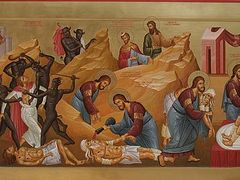When hatred of another—not just satanic hatred, but the kind that would terrify even the most bloodthirsty, dumb animals—imbues the soul, I believe that Christ never ceases to try to remind man of his divine origin. Again and again, God tries not only to raise us above the animal world, but also to snatch us from the hell to which we are rushing with suicidal obstinacy. His ages-old methods are well proven and described in the Gospel parables. But these parables are revealed to us in a new light every time we read them, as long as we look closely and listen carefully.
I was recently struck with the similarly novel nature of the mainstay parable about the Good Samaritan. The other day I was visiting Dresden, Germany. In Soviet times, some would say at this, “You’ve hit the jackpot!” During perestroika it would have been, “Lucky you!” In pre-sanction times, “So what?” Nowadays, it’d probably be something like, “You must have lost your mind! How did you withstand it all?” Times are changing far too quickly! It’s true that trips to the once much-coveted Europe have for a while now ceased to be seen as something miraculous, even less so as a reward, but by no means an inevitably pleasant necessity. As for now, with the hatred for everything Russian and Christian that exists there and is cultivated by aggressive propaganda, it’s really gotten sad. And I am ready to admit that the feeling I have when I find myself enveloped in a cloud of hatred or aggressive misunderstanding is akin to what the right-believing people of Palestine when they found themselves in Samaria.
Not everything spoken by our propaganda was an exaggeration. It is true that there is hatred. But there are exceptions
It may take a while to describe the “Samaritans” among the Germans and their attitude to the “right-believing” from Russia. Besides, it is a rather thankless task. To save time, I’ll just say that not everything our propaganda said about them was an exaggeration. It is true that there is hatred. But there are pleasant exceptions, and when compared to the Gospel story, they give us hope that the Gospel will be victorious.
Jörg is over sixty and, as he says, he will soon be able to retire. He was raised in the best traditions of the GDR (or, East Germany.—Trans.) or, in other words, he is an atheist. Not that he laughs at faith, no; he says he hasn’t just gotten there yet, or “it’s just not my thing,” or something like that. He lives alone in his house, but he is a welcoming host (the best traditions of his East German upbringing manifesting themselves). His friends show up uninvited every day, demanding a cup of coffee or something to eat, while a certain “right-believing” friend even asked to stay over for a couple of days. More often than not, they justify their visits jokingly: “You have some nerve—you live in your father’s house, while we have to live living in rented apartments. Feed us, you, miserable capitalist!” That’s how his childhood friends greeted him... And the said “capitalist” is surely happy—just try not to be happy there: His childhood friends are quite the proletarians, pretentious, raised fist, the whole thing!
The owner often proudly shows first-time visitors a museum he has set up in several rooms—old, even antique, clocks, phonographs and gramophones, radio receivers, records, books, telephones, radio-gramophones—where you just walk around admiring and marveling at everything. It is really interesting, because Jörg can tell you so much about everything there: how and why it was invented, the song’s author, what was it like at that time, and why this song or that book was written... Then he segues into his favorite topic about his hometown, and you can see Dresden not just as the capital of Saxony, but as a living city with its own joys and sorrows, very different, and often very strange (they are Saxons, after all!) inhabitants. During his presentation, he suddenly checks himself and leads his entire gang of friends into the kitchen (I’m telling you—it’s in the best Saxon tradition!) to eat something. “Not again!” groans the gang, but they gladly accept the capitalist’s invitation. The host is pleased. He’s had so many visitors—his childhood friends, classmates, and guests from all over the world—that Jörg has lost count: “I like having guests. Why not enjoy themselves? It’s hard to be on the road.”
Jörg is also the guardian of a disabled man from Russia. When the situation allowed, he often visited the orphan, helping him pay for medicine or cutting through the red tape. He has seen justice done, but often with mixed results. By the way, following detainment at the police station, the man received a new degree of disability and ended up recovering at the hospital for awhile. Naturally, the fellow’s treatment took much money and stress. Then came a partial mobilization, and the guardian to his surprise learned that the disabled man, his ward, had also been mobilized. A few months later, he received a message that his orphan was in a detention center in Kazakhstan for illegal border crossing and needed a large amount of cash to pay his fine and get out of detention. Was it a trap? Or a scam? “Hey you, German, give me money.” But heck, no; he checked everything carefully and found out that it was his orphan. He’s currently looking for a way to pay the fine and get the poor fellow’s papers in order. Knowing his tenacity, I believe he’ll be able to do what’s necessary.
But Jörg burst into tears:
“Why does it happen this way? Why does such a feeble man have to suffer like this? I love Russia and the Russians, but why is it happening this way, tell me! Why do the weak suffer this way?”
He sat up and sighed:
“I’ll still fight for him. I know this guy has made a lot of mistakes, but I’m not a stranger to him, you should understand that. Do I feel sorry for all the effort and money spent? Are you kidding me? There will be no storage space in coffin; my gramophones and phonographs won’t be needed in my coffin. So, I have to rescue the guy somehow. If I give my word, I should keep it. I’ll say it again: We’re not strangers. What if you pray for him, what do you think?”
I keep thinking, there’s the “Samaritan” for you! Neither geography nor geopolitics seems to be an obstacle for Christ. Some things are a bit more important to Him. Or some people. Like the Saxons.







